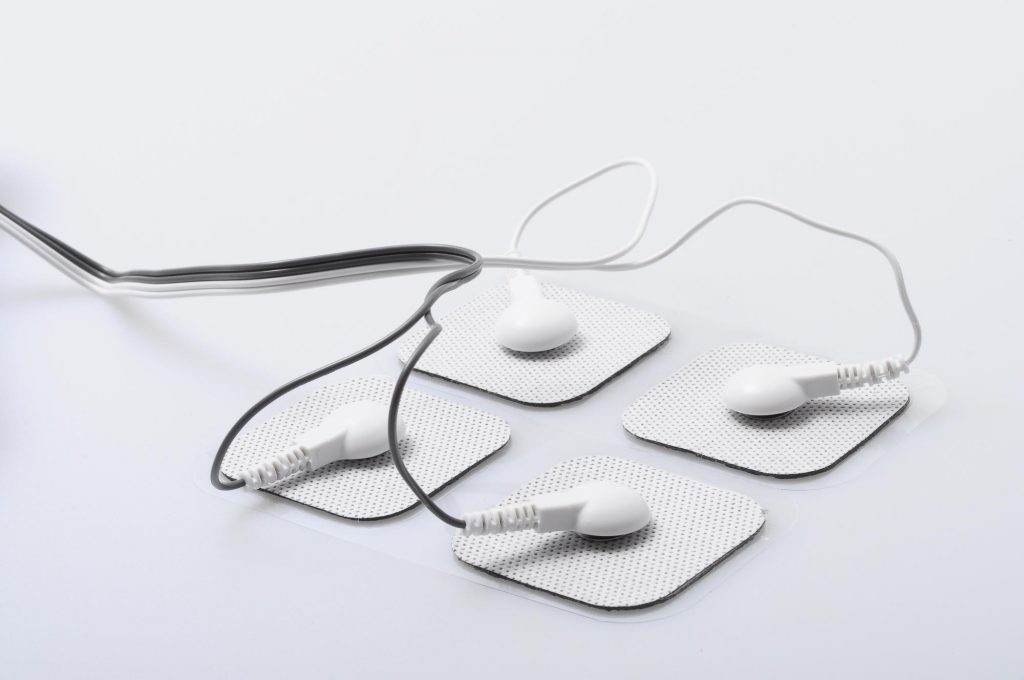
Screening for Cardiovascular Disease and Stroke Risk
Cardiovascular disease is the #1 cause of death for both men and women in the U.S., and stroke is a leading cause of disability. Understanding risk for cardiovascular disease and stroke is an important part of any preventive screening plan.
80% of heart disease and stroke events are preventable through lifestyle changes1, and knowing your risk is the first step. Review the cardiovascular disease screening tests and stroke risk screenings below. Together with your physician’s care, they go beyond your annual checkup to provide a more complete look at your health.
Cardiovascular disease is the #1 cause of death for both men and women in the U.S., and stroke is a leading cause of disability. Understanding risk for cardiovascular disease and stroke is an important part of any preventive screening plan.
80% of heart disease and stroke events are preventable through lifestyle changes1, and knowing your risk is the first step. Review the cardiovascular disease screening tests and stroke risk screenings below. Together with your physician’s care, they go beyond your annual checkup to provide a more complete look at your health.
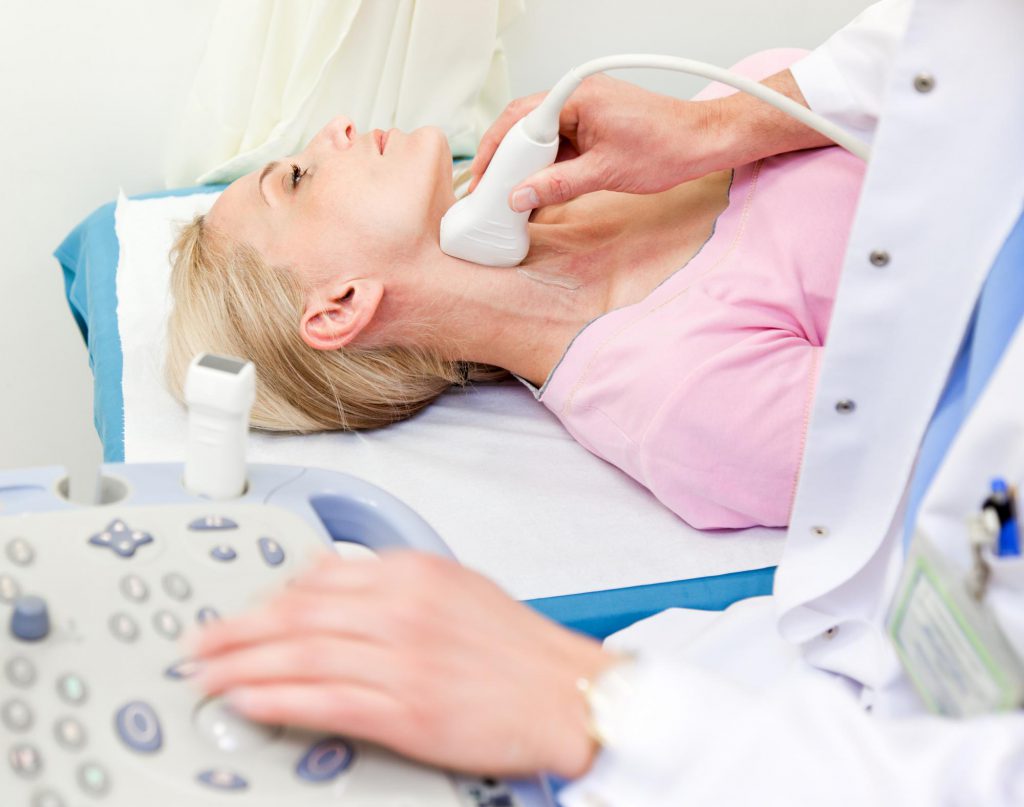
Carotid Artery Ultrasound (Plaque) Screening
The carotid arteries are the two large blood vessels on each side of the neck that supply blood to the brain. When the carotid arteries become clogged with plaque, they become narrower, affecting blood flow. If any of the plaque breaks off, it can block the blood flow to the brain, causing a stroke. The carotid artery screening test uses ultrasound to identify the presence of plaque in the carotid arteries, which can develop over time without causing any symptoms.
Peripheral Artery Disease (PAD) Ultrasound
Peripheral Artery Disease (PAD) is a condition in which the large and medium-sized arteries supplying blood to the legs become narrow or clogged with plaque, constricting the flow of blood. Peripheral artery disease (also known as peripheral arterial disease) is atherosclerosis (more commonly known as hardening of the arteries) occurring in the limbs. Peripheral artery disease may be an indication that atherosclerosis is also present in other areas of the body.
PAD reduces blood flow to the feet and legs and can cause pain in the feet and legs, as well as lead to tissue death (gangrene). People with diabetes and a history of smoking are most at risk of developing peripheral artery disease because circulation is reduced by diabetes and smoking. If this describes you, you could benefit from a peripheral artery disease test.
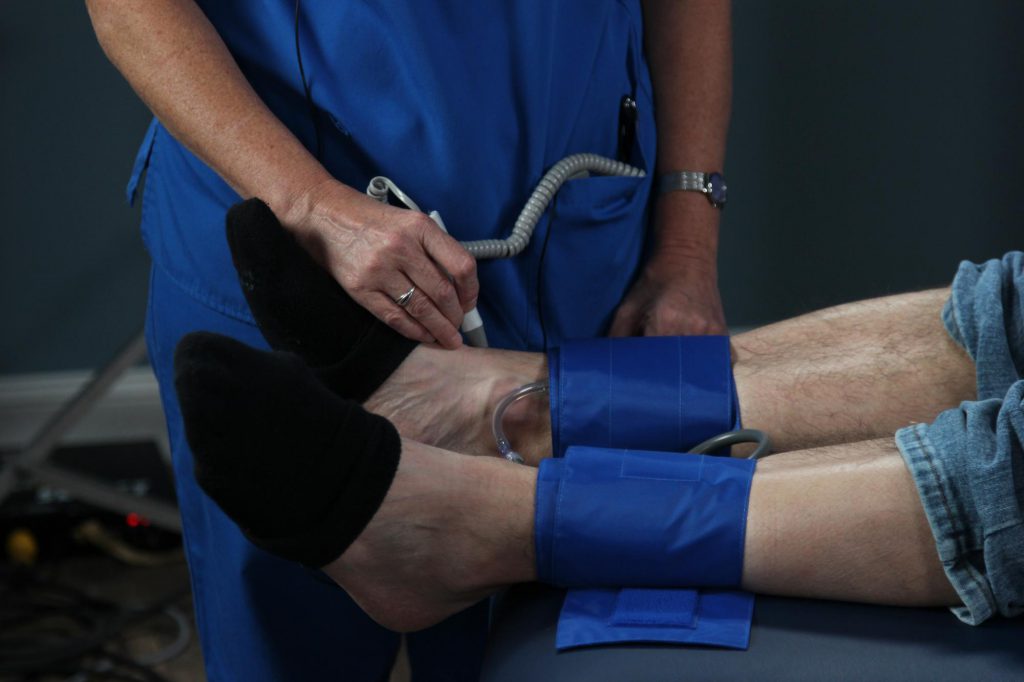
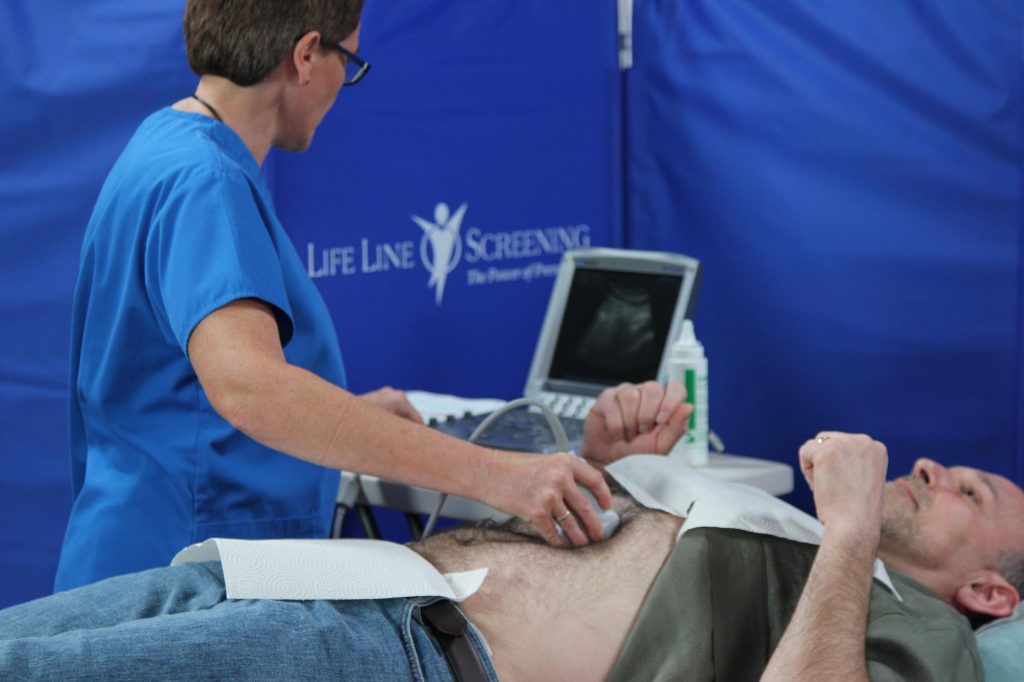
Abdominal Aortic Aneurysm Ultrasound
An Abdominal Aortic Aneurysm (AAA), is a condition in which the aorta, the largest artery in the body, stretches and balloons in the belly region. When an abdominal aortic aneurysm occurs, it weakens the walls of the artery and can rupture or leak, causing bleeding into the abdomen. When this occurs, it is a very serious medical emergency requiring immediate medical attention. While not always part of cardiovascular disease screening tests, ultrasound examination of the abdomen can detect an AAA that your doctor can monitor.
Abdominal Aortic Aneurysm Ultrasound
An Abdominal Aortic Aneurysm (AAA), is a condition in which the aorta, the largest artery in the body, stretches and balloons in the belly region. When an abdominal aortic aneurysm occurs, it weakens the walls of the artery and can rupture or leak, causing bleeding into the abdomen. When this occurs, it is a very serious medical emergency requiring immediate medical attention. While not always part of cardiovascular disease screening tests, ultrasound examination of the abdomen can detect an AAA that your doctor can monitor.

EKG Screening
In addition to screening for plaque buildup, heart disease screening tests should include an EKG examination to detect an irregular heartbeat (known as Atrial Fibrillation).

Atrial Fibrillation Screening
Atrial fibrillation (Afib) is an irregular heartbeat (also known as arrhythmia) that occurs when the upper chambers of the heart (the atria) do not beat at a regular pace. They quiver, or fibrillate. Because of the heart fibrillation, the heart sometimes does not pump all of the blood out of the atria, and blood can pool, causing blood clots. When blood clots travel to the brain, this can cause a stroke. People who have Afib are 5 times more likely to have a stroke.1
Blood Screenings
Accurate screening for cardiovascular disease also includes blood analysis. Using just a finger-stick blood sample, the screenings described below will help you and your doctor understand your overall risk for cardiovascular disease.
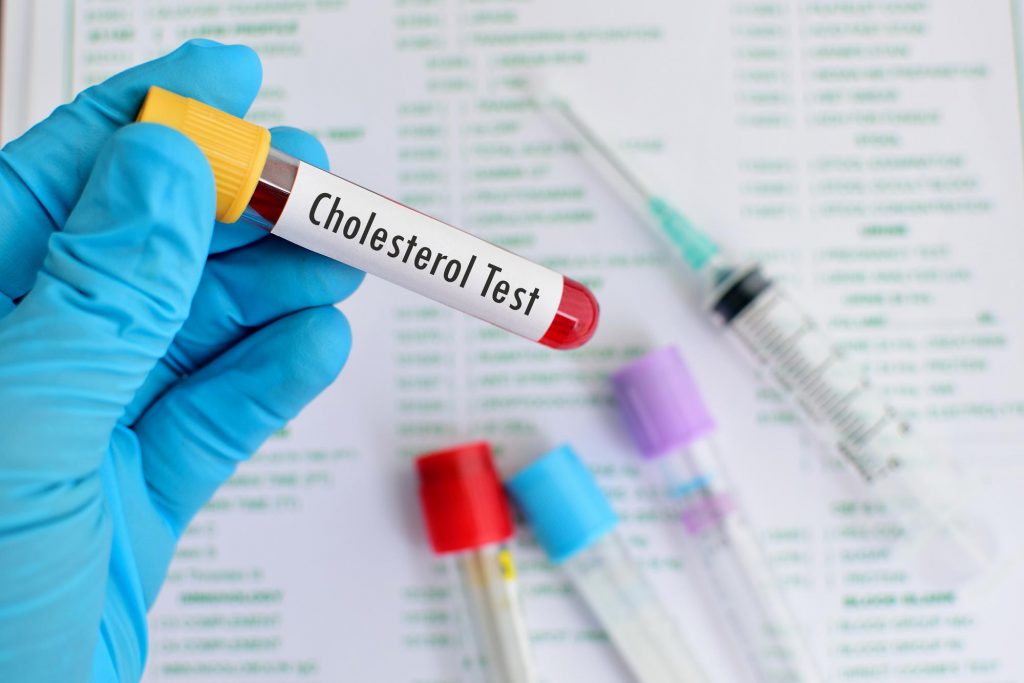
Complete Lipid Panel Screening (High Cholesterol)
A complete cholesterol blood test (also known as a lipid panel) uses just a finger-stick blood sample to measure the amount of cholesterol (both HDL and LDL) and triglycerides in the blood. Cholesterol is a waxy substance that sometimes binds with protein to cause plaque buildup in the arteries, which can lead to blood clots and risk of stroke or heart attack. Cholesterol levels in the blood are one of many factors that help determine your risk for developing atherosclerosis (plaque buildup in the arteries).
C-reactive Protein Screening
High Sensitivity C-Reactive Protein (hs-CRP) Test is a simple finger-stick blood test to detect the level of C-reactive protein in the blood, which is a marker for inflammation in the body. Inflammation in the body can indicate atherosclerosis is present, because arteries that are clogged with plaque are actually injured arteries, and cause the body to release C-Reactive protein.
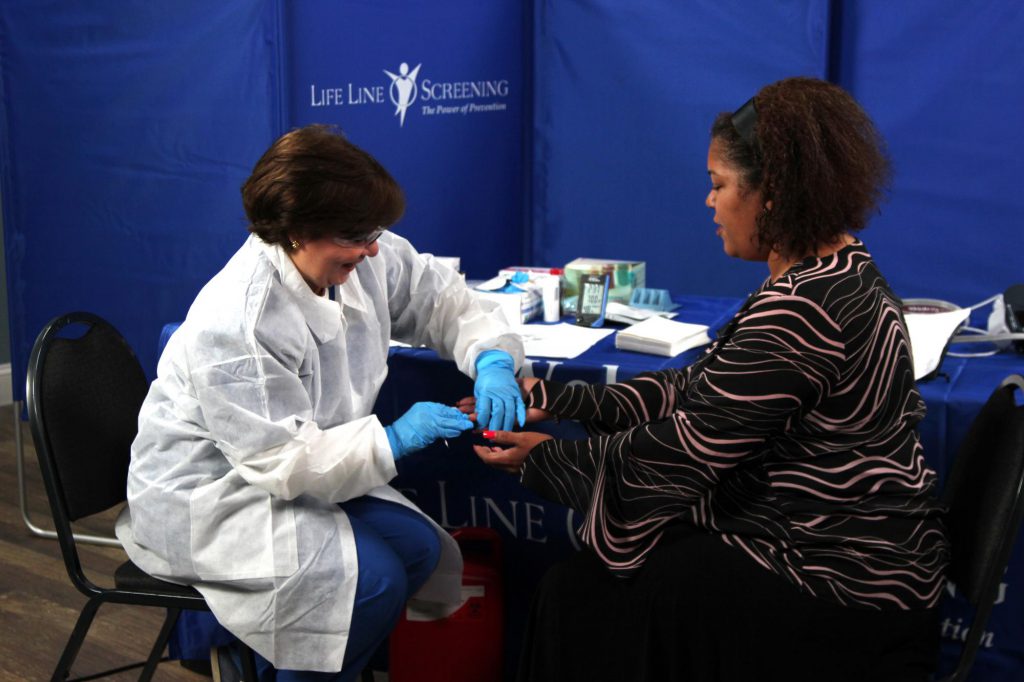

Diabetes/Glucose Screening
Diabetes mellitus refers to a group of diseases in which the body either does not produce enough insulin, or does not properly use the insulin that is produced. Insulin is the hormone produced in the pancreas that your body uses to convert the sugar in your blood (blood glucose) to energy in your cells. Blood glucose is very important to your survival: it is the primary energy source for the brain, and also critical to cells and tissues in your body. Diabetes (both Type 1 and Type 2) causes your body to have too much glucose in your bloodstream, and that can damage your health in a myriad of ways. All heart disease screening tests should include a diabetes (blood sugar) test.
High Blood Pressure Screening
A cardiovascular disease screening test would not be complete without a blood pressure reading. Quick and easy, this test is performed at every one of our heart screenings. High blood pressure is a serious condition, and over time can damage blood vessels or cause blood clots, both of which could lead to a stroke.
Warning Signs of Cardiovascular Disease
Many conditions that affect your cardiovascular system can develop without any symptoms: plaque buildup, Afib, Diabetes, and high blood pressure, to name a few. Some people with cardiovascular disease experience chest pain or shortness of breath. Both of these symptoms are also common symptoms of heart attack — if you experience either one you should get medical attention immediately.
Risk factors for Cardiovascular Disease
- Family history of stroke or heart disease
- Age 55+
- Gender (males have an increased risk)
- Smoking (past, present, or consistent exposure to secondhand smoke
- High cholesterol
- High blood pressure
- Physical inactivity
- Obesity (Body Mass Index 25 or higher)
- Diabetes
- Elevated C-reactive protein in the blood
1 American Heart Association, heart.org